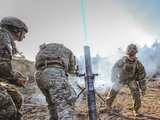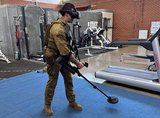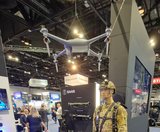General Atomics installs Predator Mission Trainer at FTTC
General Atomics Aeronautical has installed a new Predator MQ-9 Block 5 UAV trainer at the Flight Test and Training Centre (FTTC) at Grand Forks, North Dakota.
The new simulator has been manufactured by CAE and will build on the existing Block 1 simulator and Ground Control Systems.
David Alexander, president of General Atomics Aeronautics, said: ‘The Predator Mission Trainer [PMT] will be used to advance the quality and capability of our… training at the FTTC.’
‘The PMT will increase training efficiency because it allows us to focus our training and repeat training events in the simulator more easily than on an actual flight system,’ he continued.
Related Equipment in Defence Insight
More from Training
-
![Cubic tailors mortar simulator for the US Army]()
Cubic tailors mortar simulator for the US Army
The company’s mortar trainer received improvements based on soldier’s feedback.
-
![Saab expands footprint in the US]()
Saab expands footprint in the US
The company will operate in two new locations in the coming years to better support US services.
-
![How terrain management capabilities can improve military training]()
How terrain management capabilities can improve military training
This type of tool provides more realistic training easing the incorporation of new scenarios that accurately represent the threats of the battlefield.
-
![I/ITSEC 2024: Australian Army approaches second phase of countermining training]()
I/ITSEC 2024: Australian Army approaches second phase of countermining training
The Engineering Corps has been conducting individual instruction using FLAIM Systems’ Sweeper and should start collective deployments in 2025.
-
![I/ITSEC 2024: Zeiss introduces Velvet 4K SIM projector for night flight simulation]()
I/ITSEC 2024: Zeiss introduces Velvet 4K SIM projector for night flight simulation
The next-generation platform is motion-compatible and can be used in OTW and NVG applications.
-
![I/ITSEC 2024: Saab introduces UAV live training capability]()
I/ITSEC 2024: Saab introduces UAV live training capability
The system can be used to prepare soldiers for both drone offensive operations and CUAS missions.



























